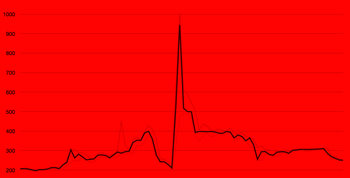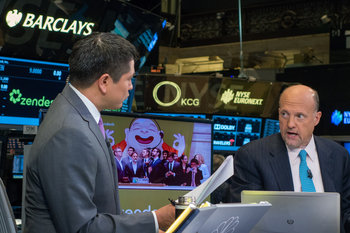|
| |
Dumb money is a term for capital managed by individual retail investors. This is a neologism created by the financial media as a contrast with smart money, capital managed by large institutions. The following are characteristics that are commonly associated with retail investors aka dumb money.Speed, Technology & DataRetail investors have less access to high speed market technologies and data. For this reason, smart money likes to trade with retail investors as they often transact at a market price and may be unaware of fast breaking news. This results in questionable practices such as payment-for-order-flow, whereby smart money pays for access to dumb money order volumes.Morning TradesRetail investors have a reputation for trading in a panic in the morning based on overnight news.
Fear of Missing OutA tendency to pile into popular trades driven by a fear of missing out. FearA capacity for panic whereby investors rush to sell creating fear that causes more investors to rush to sell.SpeculationSpeculation is a tendency to trade based on price predictions as opposed to the fundamental financial realities of an investment.Noise TradingTrading patterns that aren't driven by market information. For example, technical trades whereby an investor sells a stock because it has reached some psychological price point such as $100.Regression Toward the MeanRegression toward the mean is the tendency for unusual results to revert towards average in the long run. For example, buying an overpriced stock because it's popular may work for a while such that an investor feels they are achieving alpha. However, an overvalued asset with a price driven by fear of missing out may quickly correct such that this strategy may fail in the long run.ContrariansRetail investors don't always pursue popular trades but may also try to take a contrarian view. It is very difficult to compete with smart money in this area as analysis of investments is a complex undertaking. In other words, if you feel that something is too cheap it may be that you are missing something that insiders and trained professionals understand. According to the efficient market hypothesis, investments aren't often mispriced. Passive InvestingBy periodically investing in an index fund, for example, the know-nothing investor can actually outperform most investment professionals. Paradoxically, when 'dumb' money acknowledges its limitations, it ceases to be dumb.
~ Warren Buffet, 1993 The term smart money can be misleading as the financial media commonly portrays them as outperforming the market. According to the efficient market hypothesis it is extremely difficult to outperform market indexes over the long run. As such, retail investors who buy and hold passive investments can do better than investors who are paying large fees to smart money for their expertise1.NotesGenerally speaking, retail investors have more of a disadvantage when it comes to active trading and are considered unlikely to achieve alpha over smart money with such strategies in the long term. This disadvantage decreases significantly for passive strategies. For example, the conviction investor who buys a solid company and holds it for 20 years.
Behavioral Finance
This is the complete list of articles we have written about behavioral finance.
If you enjoyed this page, please consider bookmarking Simplicable.
1 Schizas, Panagiotis. "Active ETFs and their performance vis-à-vis passive ETFs, mutual funds, and hedge funds." The Journal of Wealth Management 17.3 (2014): 84-98.
© 2010-2023 Simplicable. All Rights Reserved. Reproduction of materials found on this site, in any form, without explicit permission is prohibited.
View credits & copyrights or citation information for this page.
|





























